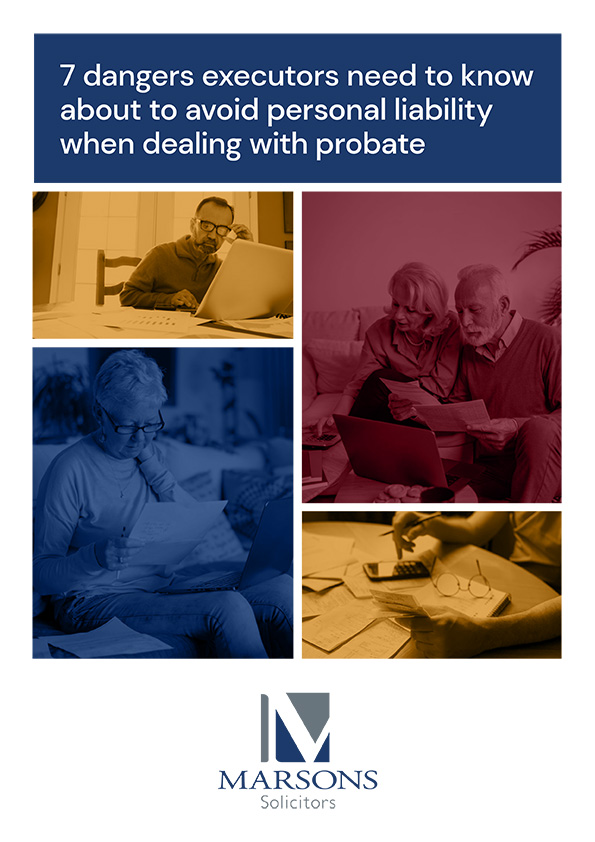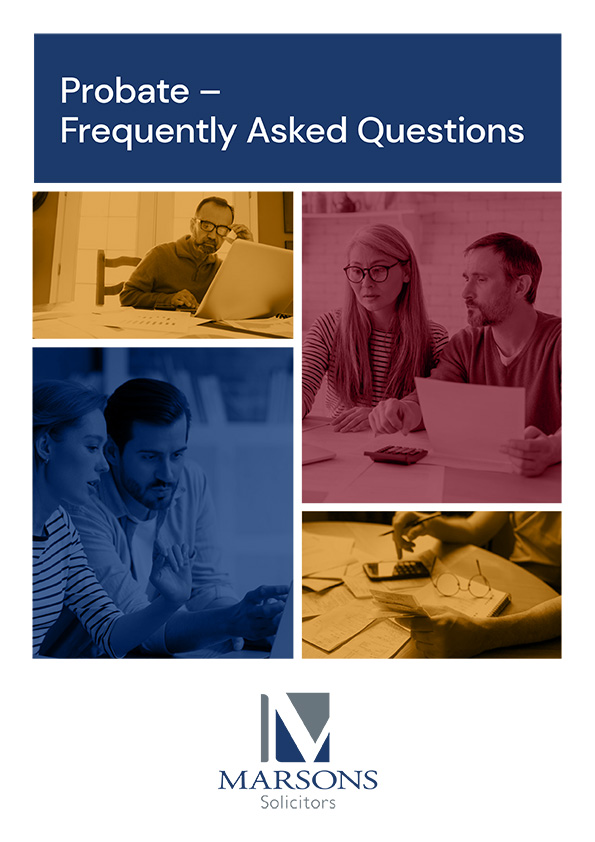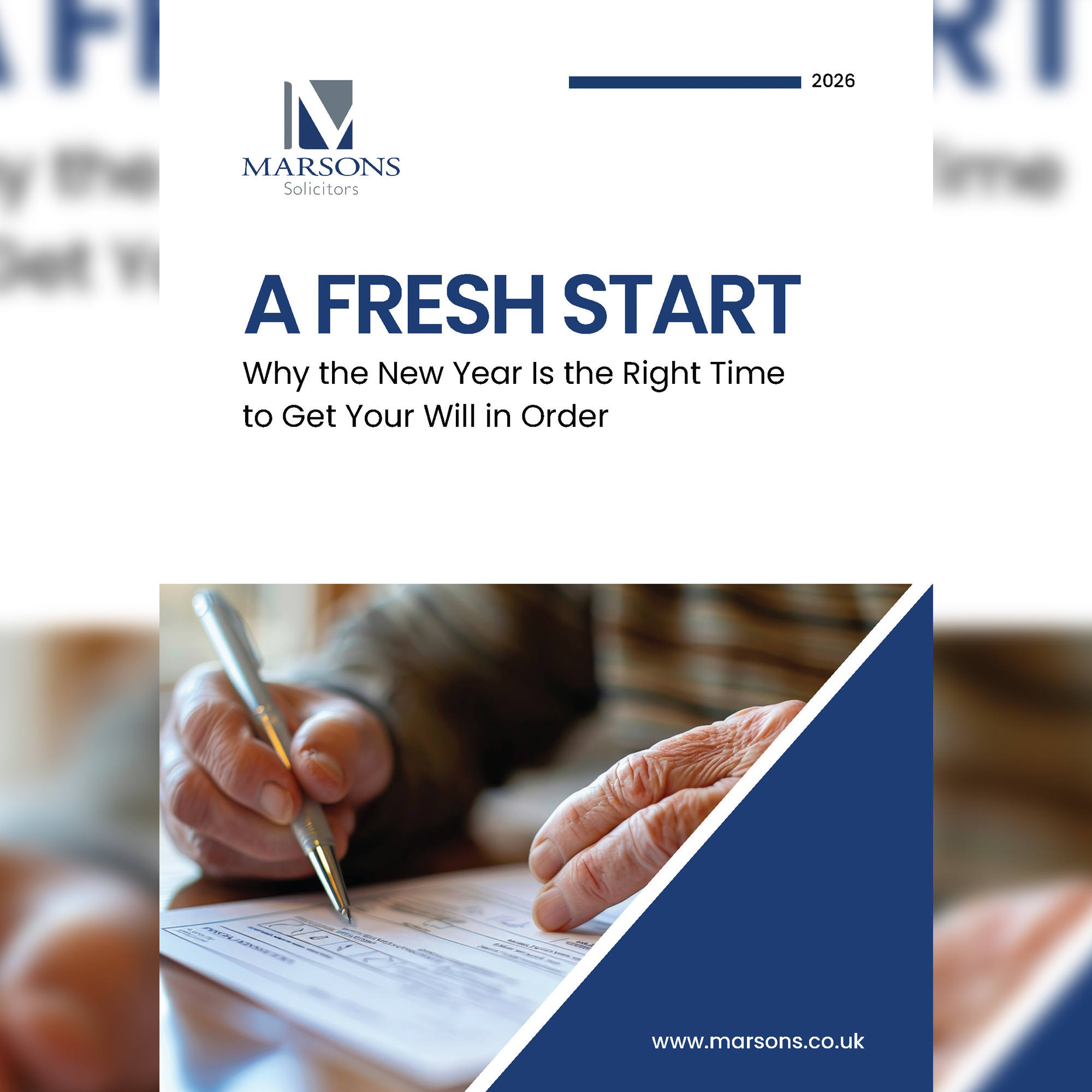Probate – Frequently Asked Questions

What is probate?
Probate is the legal process of dealing with someone’s estate and distributing the assets to whoever is entitled, either under the deceased’s will or according to the rules of intestacy.
To gain the legal right to deal with the estate, a Grant of Probate is required. In order to obtain a grant, the will first needs to be ‘proved’. This essentially means showing the probate court the will is valid and is the final will of the deceased. It is usually just a paperwork exercise and does not involve going to court.
Who can obtain a Grant of Probate will depend on the circumstances. If the deceased left a will, the named executors are entitled to apply. If there is no will, it is usually the spouse or other family members under the intestacy rules. In this case, they are given a physical piece of paper bearing a court seal called a Grant of Letters of Administration rather than a Grant of Probate.
If there is no will, you can check who is entitled to an estate under the intestacy rules on the government’s website here.
What is an executor?
When someone makes a will, they usually decide who they want to deal with the probate process when they die. These people are called executors. They may be family members or close friends but could also be their solicitors.
What is an administrator?
Where there is no will, the person who applies for the Grant of Letters of Administration is called the administrator of the estate.
What if there is a will but no executors?
Executors and administrators are also known as the “personal representatives” of the estate.
If there is a will but no executors have been appointed (or they are unable to act because they have died, been declared bankrupt or lack capacity for any reason), whoever is entitled under the intestacy rules can apply for a “Grant of Letters of Administration with the Will”. This will allow them to act as administrators but they are required to deal with the estate in accordance with the terms of the will.
Do I need to get probate?
Whether or not probate is required depends on the assets left behind by the deceased. If all the assets were part-owned with someone else, they will normally be inherited automatically by the surviving owner. In the case of property, this only applies if they were listed as joint tenants. Some people will hold property as tenants in common, so their share does not pass automatically to the other owner when they die. Instead, it can be left to someone else in the will or, if there is no will, it passes to whoever is entitled under the intestacy rules. A solicitor can check this for you or you can check with the Land Registry.
In most cases, where property is owned as tenants in common, or in the deceased’s sole name, probate will be required. Money in banks and building societies can sometimes be obtained without a Grant of Probate or Letters of Administration. Some banks and building societies will pay out from accounts up to a certain threshold, e.g. Nationwide Building Society’s limit is £50,000. Others will only pay out up to £30,000, while some insist on a grant before they will pay anything at all.
If the estate is relatively small, and the property is joint-owned or falls under the bank’s threshold, you may not need to apply for probate. However, quite often, even a small estate will include one or two assets, such as shares or ISAs, which cannot be cashed in without a grant.
What does probate involve?
Once you have the death certificate and have arranged the funeral, you can get on with the process of sorting out the estate.
The main stages are:
1. Establish if there is a will and locate it. If there is more than one will, this can be tricky, as you need to be sure you are using the latest one and that it is valid. If there is no will, and you are dealing with an intestacy, you may have to check the family tree carefully and locate any missing relatives.
2. Review the will, or check the intestacy rules, to see who is entitled to apply for a Grant of Probate and who the beneficiaries are. Check you understand the terms of the will, as these can be full of legalese and there may be provisions in the Wills Act 1837, which could catch you out. Legal advice is essential to ensure you don’t pay out to the wrong people.
3. Value the assets and calculate any debts owed. You will need to notify the relevant authorities (DWP, HMRC etc.), as well as utility companies, banks, etc. Part of gathering the assets will include checking any entitlements to life insurance pay-outs and establishing if the deceased made any gifts in the seven years leading up to their death, which might affect the amount of Inheritance Tax due. This is one of the most important stages of the process. It is essential everything is valued accurately, and the right amount of tax is paid. Getting this wrong could lead to substantial personal liability if beneficiaries lose out.
4. Prepare and send the Inheritance Tax forms to HMRC. You will need to declare any gifts and relevant reliefs from Inheritance Tax, as well as transfer any unused nil rate sums from a deceased spouse to minimise the amount of tax due. Once the amount has been finalised, you need to arrange to pay any Inheritance Tax due. There are time limits for declaring and paying Inheritance Tax and for making variations to the will or intestacy to take advantage of tax savings, so ensure this is completed in a timely manner to avoid accruing fees, which you may be personally liable for.
5. Submit your application for the Grant of Probate. This can only be completed once the Inheritance Tax has been declared and paid.
6. Deal with the assets. Once you’ve received the grant you are legally authorised to handle the estate. You will need to close bank accounts, sell or transfer any shares or investments, pay any outstanding bills, and sell any houses, cars or other assets. It may be necessary to advertise for any potential creditors, who may contact you when they hear about the grant being issued – for example, if the DWP thinks the deceased may have had more assets than declared, they will request information, which could lead to a claim to repay overpaid benefits.
7. Prepare accounts to show how much is left to pay out to the beneficiaries.
8. Pay out the money to the beneficiaries. If you pay too much, you could be left trying to get money back from them if debts or other claims arise later. HMRC can chase underpaid tax many years later by which time the beneficiaries may well have spent the money.
9. Store the paperwork in a safe place. You may be required to present it if HMRC has any queries over the next few years.
There may also be claims made against the estate by creditors, either from disgruntled relatives who think they should have received more, or from others claiming to have a more recent will or that your will is not valid. If such claims arise, or you think they might, do not attempt to tackle them alone, as they can be complex and you will need good legal advice to ensure you don’t leave yourself or the estate exposed to extra costs and litigation. Do not pay out anything from the estate if there are any outstanding claims – these must be dealt with first.
Do I need to use a solicitor?
You do not need to use a solicitor when dealing with probate, but you need to weigh up the risks if you choose not to. Dealing with the estate of someone who has died is a lot of work and involves meeting a number of deadlines, so there are many pitfalls to watch out for. If you know you’ve been appointed as an executor, or you think you may be entitled to be an administrator if there is no will, download our guide, seven dangers executors need to know to avoid personal liability when dealing with probate, because you don’t want to find yourself personally liable if anything goes wrong.
You may find the will appoints you and a solicitor to act as joint executors. The deceased is likely to have chosen this for a very good reason, so it is important to consider their intentions and wishes. The executors are bound to act in the best interests of the estate, so it may be that the solicitor insists on acting as an executor. However, if the estate is straightforward, they may agree to “renounce” their right to probate so you can do the work yourself, if you feel you have the time and knowledge to manage the paperwork and want to reduce costs.
If you find yourself having to handle someone’s estate, it is always worth asking expert probate solicitors for an estimate of fees, so you can evaluate whether you think it is worth handling by yourself. You also do not have to hand everything over to a solicitor. If you are willing to do some of the legwork, we are happy to quote for just handling the more difficult paperwork, such as obtaining the Grant of Probate. In this case, you provide the figures for all the assets and liabilities and we prepare the Inheritance Tax forms and apply for the grant. You can then use the grant to collect the assets and pay out to the beneficiaries.
If you do not have the time and want the peace of mind that everything has been handled properly and there is no risk of claims against the estate at a later date, we are more than happy for you to give us all of the deceased’s papers and take the whole headache off your hands. We will always give you an estimate of the timeframes and costs. We will keep you informed of progress throughout the process and all we ask you to do is sign forms from time to time.
If you would like to find out how we can help, contact Beth King for a free 15-minute Probate Review Session. This can be conducted over the phone or by video call at a time to suit you. In the session, we will:
1. Get an overview of the estate, assets and liabilities
2. Identify any areas of concern which might need investigation
3. Consider if there are any possible areas for tax savings which might be explored
4. Look at how we can help you resolve any disputes or issues which have already arisen
Don’t risk personal liability by trying to do it all yourself – get advice and help from professionals experienced in administering estates, interpreting wills and dealing with disputes.
To find out more about the potential pitfalls of being an executor, download our free guide: Seven dangers executors need to know to avoid personal liability when dealing with probate.
Resources
7 Dangers Executors Need to Know










